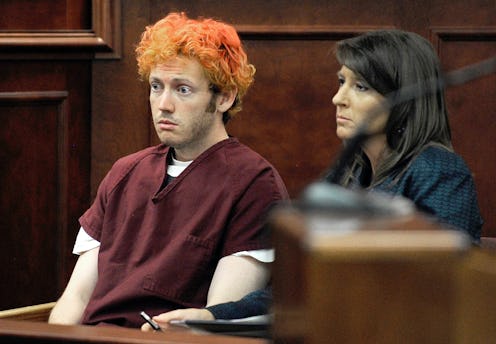News
Will James Holmes Get The Death Penalty?
The verdict is finally in. On Thursday, James Holmes was officially found guilty of murder, nearly three years to the day after he opened fire on an Aurora, Colorado movie theater, killing 12 and injuring 70. To say the ruling is a long-awaited relief for the families of his victims and his survivors would be a major understatement. But now that the lengthy and emotional trial is over, one big question still remains: Will Holmes get the death penalty for his crimes, or will his insanity plea prevail?
The massacre at the Century Theater shocked the nation — and the world — when it first made headlines on July 20, 2012. Holmes, who was accused of opening fire in the crowded theater during a midnight showing of The Dark Knight Rises, was almost immediately taken into custody and charged with 166 counts of murder. But despite a mountain of evidence that indicated Holmes had meticulously planned and premeditated the shooting, his legal team entered an official defense of not guilty by reason of insanity. And while today's verdict was a huge victory for those seeking punishment for Holmes, they'll have to wait until an official sentencing is reached. In this case, the decision rests in the hands of the jury, and not the judge.
As for the jury's verdict, that came impressively quick — just a day and half after deliberation. But the sentencing phase will take a bit more time, and will involve jurors listening to further testimony about whether or not Holmes should get the death penalty. During the 47-day trial, the 12-person jury saw nearly 250 witnesses, 14,000 evidence photos, and listened to heartbreaking stories from the survivors. They also heard from four different psychiatrists, whose testimonies no doubt played a strong role in Thursday's verdict.
Of the four psychiatrists to testify, two said that, while they found Holmes to be delusional, they believed he was more than capable of making his own decisions the day he walked into that theater. Holmes' attorneys argued strongly that the 27-year-old suffers from schizophrenia. But as Dr. Jeffrey Metzner testified on the stand, the defense doesn't hold water in this instance, even if that is the case. "Someone could have a chronic mental illness and they're not psychotic all the time," Metzner told the jury. "His planning of the shooting was well thought out, and it was thought out in a manner to delay getting caught."
Metzner backed up his diagnosis with a wealth of incriminating facts that are pretty hard to argue. For example, Holmes carefully researched police response times to other mass shootings while planning the attack, and wore body armor before going into the theater, which indicated that he knew police — or someone — would try to stop him from leaving. He also purposely ordered his ammunition online, and had them sent in separate shipments, so that he wouldn't raise any red flags — yet another sign that his planning was not the act of someone who was mentally incapable of telling right from wrong.
On the other hand, the other two experts who testified during the trial said the exact opposite: Holmes was suffering from a psychotic episode during the attack, and in that moment, couldn't distinguish right from wrong. All four experts did agree on one thing, though: Holmes' mental illness ultimately led to the shootings.
There is also another, more emotional aspect to the sentencing that will likely play in the back of each juror's mind when they deliberate again: Just what do the victims, the survivors, their families, and, frankly, the entire Aurora community want to happen to Holmes? According to the Christian Science Monitor, there's been a growing ambivalence toward the death penalty in Colorado — much like in the rest of the U.S. In fact, Colorado has only executed one person since 1976, and only three currently sit on death row.
"It is a penalty that has been used very infrequently; it is a penalty which the people of Colorado do have very mixed feelings about," Karen Steinhauser, a former prosecutor and Colorado defense attorney, recently told the CS Monitor. But as the outlet notes, many of the victims and their family members have openly stated they feel the death penalty is the only acceptable punishment.
"I don't know if it's painful. I want him dead. I just want to be there in the room when he dies," Bryan Beard said outside the courthouse after Holmes' arraignment in 2013. "He took one of my friends from this Earth. Death equals death."
No matter what the outcome, though, Holmes' fate is sealed. Even if the jury doesn't seek the death penalty, he'll be committed to a state mental hospital indefinitely. Though whether or not the latter would be justice enough for his victims and their families, is another story.
Images Getty Images (2)
